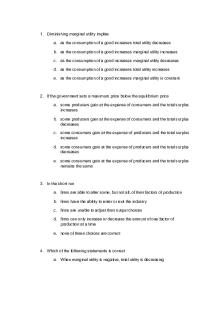ACP W131 - Micro 2 - Stronger Sample PDF

| Title | ACP W131 - Micro 2 - Stronger Sample |
|---|---|
| Author | Autumn Oliver |
| Course | English, Reading Writing |
| Institution | Indiana University - Purdue University Indianapolis |
| Pages | 2 |
| File Size | 102.9 KB |
| File Type | |
| Total Downloads | 82 |
| Total Views | 168 |
Summary
Download ACP W131 - Micro 2 - Stronger Sample PDF
Description
Student’s Last Name 1
Student’s Name Instructor’s Name Eng. W131 Date What Does Happiness Do?: A Critique of David Brooks’s “What Suffering Does” In “What Suffering Does,” New York Times columnist David Brooks counters the popular belief that the purpose of life is to “maximize happiness” by arguing for the importance of suffering in the development of morally-guided and engaged individuals (286). Through his definition of suffering and the binary structure of his reasoning, Brooks implicitly casts happiness and its pursuit as shallow endeavors unable to inspire moral action. Brooks employs a broad definition of “suffering,” which suggests his interests lie more in, as his title states, what suffering does than the nature of suffering itself. For instance, he uses such synonyms as “agony,” “difficulty,” and “ordeal” (286) to develop a sense of “suffering” as generalized struggle, as anguish regardless of source or object. Such broadness allows Brooks to place on the same plane a polio-stricken Franklin Roosevelt; an artist agonizing to realize their vision; Lincoln, fighting to keep the country together; parents who have lost children; and even concentration camp prisoners (286-7). Brooks does not seem to want to suggest that all suffering is the same, however; rather, the disparate types of suffering allow Brooks to bolster his claim that whatever form one’s suffering takes it often produces similar effects: many “in the midst of difficulty begin to feel a call” (286). Brooks wants to argue that suffering, as opposed to happiness, can make one feel “instrument[al]” in “transcendent tasks” (286); that is, the process of suffering can make one aware of oneself as an agent in something bigger. Because Brooks is responding to what he sees as the misguided belief that “the main goal of life is to maximize happiness,” readers can assume that for Brooks happiness cannot lead to the sense of purpose and, presumably, fulfillment, that he sees suffering potentially leading to (285-6).
Student’s Last Name 2
Importantly, to be an “instrument,” a tool in service of some larger will or cause, is neither passive nor self-effacing, for Brooks, but, rather, active and self-affirming. We can see this in the binary logic structuring his thinking and reasoning: even though those who suffer may feel called to serve something more meaningful than “individual utility” (287), Brooks does not abandon the importance of the individual. Brooks suggests that people “feel formed through suffering” because “suffering drags you deeper into yourself” (286). At the same time, however, it is only by being dragged deeper into oneself that one, according to Brooks, learns to recognize “their own limitations”: the sufferer cannot will the pain away, cannot turn off their grief, and, similarly, cannot account for what causes the eventual relief (286). Interestingly, it is this lack of control over one’s suffering and healing that Brooks suggests makes the individual aware of their instrumentality in larger forces; and this awareness often results, like grieving parents who begin memorial foundations, in moral action (287). For Brooks, then, if suffering “drags you deeper into yourself” it also, and paradoxically, moves people to “hurl themselves deeper and gratefully into their art, loved ones and commitments” (287). It’s noteworthy that while suffering “drags” a rather powerless individual, it’s the individual who actively “hurls” him- or herself into moral action. In this way, Brooks frames suffering as a means for reconciling the tension between oppositions: self/other; individual/instrument; internal will/external forces; action/passivity. Through his binary reasoning Brooks seems to suggest that suffering does nothing less than provide the individual with a profound understanding of their situated-ness in and moral responsibility to the world; effects, so Brooks’s reasoning implies, unlikely achieved through the pursuit of happiness. What, Brooks’s essay ultimately asks, can one really do with happiness?
Work Cited Brooks, David. “What Suffering Does.” Writing and Reading for ACP Composition. 3rd ed., compiled by Christine R. Farris and Deanna M. Luchene, Pearson, 2018....
Similar Free PDFs

Micro Exam 2
- 31 Pages

Micro #2 - Lecture notes
- 19 Pages

Micro TEST 2
- 25 Pages

Micro 2 - Lecture notes 2
- 18 Pages

Frequência 2 micro
- 4 Pages

Pre micro 2
- 7 Pages

Lab Practical 2 Micro
- 7 Pages

Week 6 - ACP PCP Pharmacology
- 15 Pages

Tort Outline FOR ACP - tort
- 5 Pages

Micro
- 538 Pages

Resumenfinal-ACP - actores uned
- 35 Pages

ACP vs CPG - review
- 9 Pages
Popular Institutions
- Tinajero National High School - Annex
- Politeknik Caltex Riau
- Yokohama City University
- SGT University
- University of Al-Qadisiyah
- Divine Word College of Vigan
- Techniek College Rotterdam
- Universidade de Santiago
- Universiti Teknologi MARA Cawangan Johor Kampus Pasir Gudang
- Poltekkes Kemenkes Yogyakarta
- Baguio City National High School
- Colegio san marcos
- preparatoria uno
- Centro de Bachillerato Tecnológico Industrial y de Servicios No. 107
- Dalian Maritime University
- Quang Trung Secondary School
- Colegio Tecnológico en Informática
- Corporación Regional de Educación Superior
- Grupo CEDVA
- Dar Al Uloom University
- Centro de Estudios Preuniversitarios de la Universidad Nacional de Ingeniería
- 上智大学
- Aakash International School, Nuna Majara
- San Felipe Neri Catholic School
- Kang Chiao International School - New Taipei City
- Misamis Occidental National High School
- Institución Educativa Escuela Normal Juan Ladrilleros
- Kolehiyo ng Pantukan
- Batanes State College
- Instituto Continental
- Sekolah Menengah Kejuruan Kesehatan Kaltara (Tarakan)
- Colegio de La Inmaculada Concepcion - Cebu



